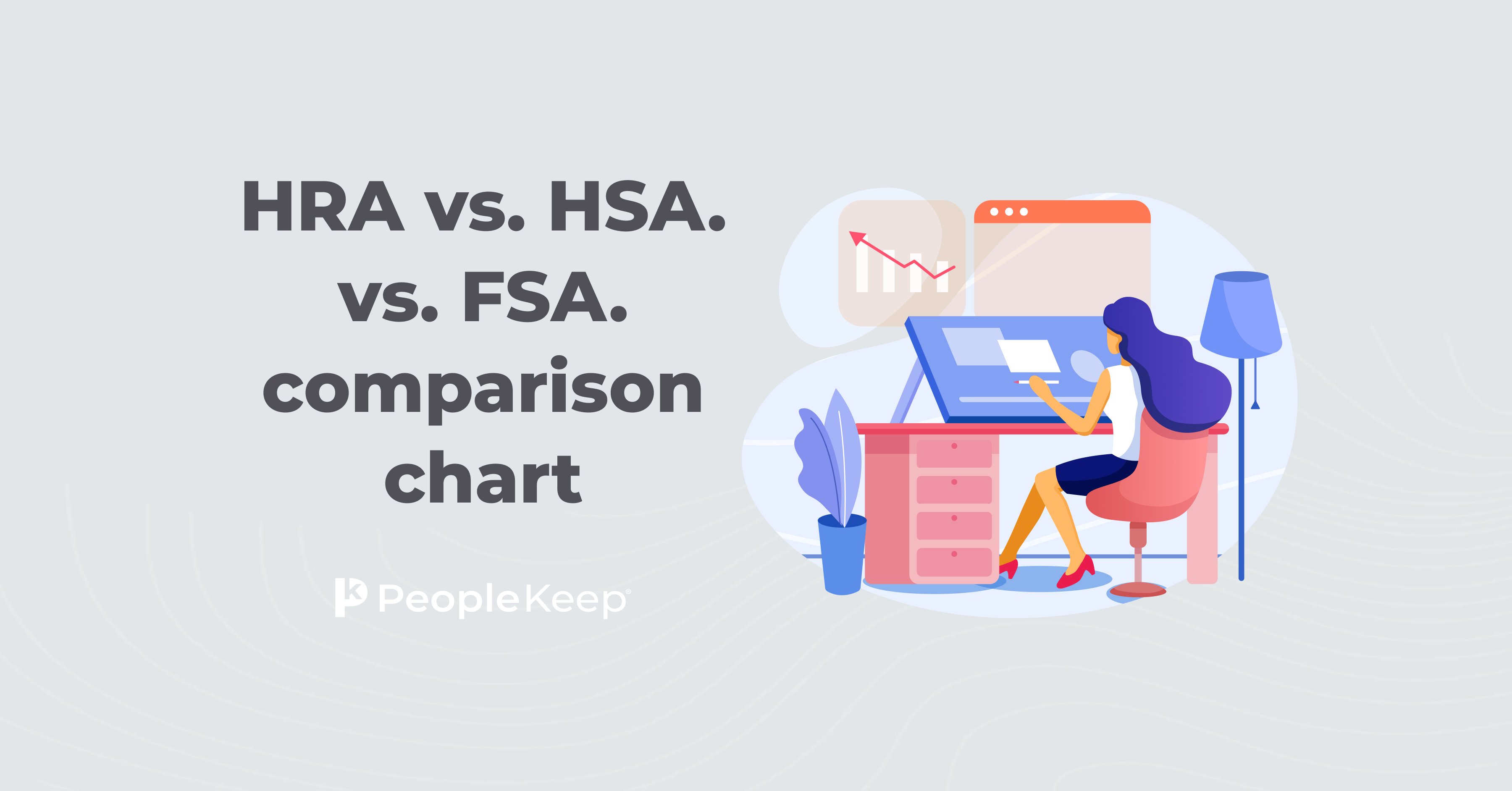Health savings account (HSA) FAQs
By Holly Bengfort on July 21, 2025 at 12:45 PM
Healthcare costs are constantly rising, and it's important to find effective tools that can manage these expenses.
Many Americans rely on health savings accounts (HSAs) as investment vehicles to help with their medical bills. According to a recent Devenir survey1, more than 61 million individuals had HSAs by the end of 2023. The survey also found that Millennials drive HSA growth. They owned about 30% of those accounts.
In this article, we'll go over what HSAs are, how they work, and answer some common questions about them.
In this blog post, you'll learn:
- The tax advantages of HSAs.
- How to qualify for an HSA.
- The differences between an HRA, HSA, and FSA.
What is an HSA?
A health savings account (HSA) is a flexible savings vehicle that allows you to save pre-tax money from your paycheck in an account that earns interest.
You can use the funds to pay for qualified medical expenses, such as:
- Doctor visits
- Prescription drugs
- Diagnostic medical services
- Dental care
- Vision care
- Over-the-counter medications
With an HSA, you can withdraw funds tax-free, reimburse yourself for qualified healthcare expenses, or defer taking such reimbursements indefinitely without penalties.
HSAs have unique tax advantages, including:
- Employee and employer contributions are tax-deductible.
- Tax-free investment growth.
- Tax-free distributions for qualified health expenses.
How does an HSA work?
Your HSA contributions are deposited into a savings account that allows you to earn interest on your healthcare dollars. These tax-free contributions are FDIC-insured. Both you and your employer can choose to contribute to your HSA.
Generally, you use your HSA funds to pay for eligible expenses up to your individual or group health insurance plan deductible. Once you reach the deductible, your health plan coverage begins. But, you can still use it for HSA funds for any qualifying expenses after that point.
Your HSA provider usually issues you a debit card. When you use your HSA debit card to cover your medical services, the payments are automatically withdrawn from your account. Unused money remains in your HSA until you use it.
How do HSAs help you save money?
Having an HSA can help you save money, both in taxes and medical costs. First, you reduce your total annual taxable income as you deposit funds into your HSA. This is because you can claim tax deductions for your HSA contributions, even if you don’t itemize your return. Employer contributions are pre-tax. When you need to use your HSA to cover medical expenses, you once again save money. This is because all funds withdrawn from your HSA for a qualified healthcare cost are tax-advantaged.
Since an HSA is a savings account, it can earn interest over time. According to IRS Publication 969, this interest is tax-free.
Am I eligible for an HSA?
Many factors determine HSA eligibility. To open an HSA, you need a qualified high deductible health plan (HDHP). This can be an HDHP you purchase on your own or get through your employer's group health insurance coverage. Additionally, the One Big Beautiful Bill Act (OBBBA) passed by Congress on July 3, 2025, qualified all bronze and catastrophic plans sold on public health exchanges as HSA-eligible HDHPs2.
HDHPs typically have a higher annual deductible than traditional health plans. For 2025, an HDHP is any health plan with a minimum deductible of $1,650 for individuals and $3,300 for families3. The maximum annual out-of-pocket limit is $8,300 for self-only coverage and $16,600 for family coverage.
For 2026, an HDHP must have a minimum deductible of $1,700 for individuals and $3,400 for families. The maximum annual out-of-pocket limit is $8,500 for self-only coverage and $17,000 for family coverage4.
To qualify for an HSA:
- You must have coverage under an HDHP on the first day of the month you are contributing to an HSA.
- You have no other health coverage except what is permitted in IRS Publication 9695. Acceptable additional coverage includes:
- Workers’ compensation
- Insurance for a specific illness, like cancer
- Hospital coverage where you earn a fixed amount per day of hospitalization
- Ancillary coverage like accident insurance, dental and vision care, and long-term care insurance
- Direct primary care arrangements (Effective 2026 due to the OBBA)
- You aren't enrolled in Medicare.
- Nobody can claim you as a qualified dependent on their tax return for the year.
How much can I contribute to my HSA?
Investing in an HSA makes it easier to handle your current and future health expenses. You can make direct contributions to your HSA at any time, but there are annual limits to how much you can contribute.
Catch-up contributions are available to those age 55 or older to help make up for the years you might not have contributed to an HSA when you were younger. Your catch-up amount is an additional contribution that's separate from the annual contribution limits for an HSA.
The federal government adjusts the maximum contribution limits guidelines for HDHPs and HSAs each year.
For 2025 and 2026, the maximum limits are as follows:
|
Contribution type |
Self-only coverage |
Family coverage |
|
2025 HSA contribution limit |
$4,300 |
$8,550 |
|
2026 HSA contribution limit |
$4,400 |
$8,750 |
|
HSA catch-up contribution |
$1,000 |
$1,000 |
If you go over the annual contribution limit, you could end up with excess funds. This means you would have to pay a 6% excise tax on the excess contribution if you didn't withdraw the amount from your HSA before the tax filing deadline. In addition to the excise tax, the additional funds would count as taxable income and wouldn't qualify as a tax deduction for contributions when you file.
If you're unsure of how to account for your HSA contributions, consulting a tax advisor is a great way to make sure you file your tax return correctly.
What types of expenses can an HSA cover?
You may spend HSA money tax-free on out-of-pocket healthcare expenses, such as deductibles, copays for medical care, prescription drugs, or bills not covered by insurance, such as dental and vision care expenses.
The IRS specifies which medical services and items qualify for tax-free use with HSA funds in IRS Publication 502.
If you use HSA funds for non-medical expenses before turning 65 years old, you must pay taxes on the withdrawal plus a 20% penalty.
After 65, you can use your HSA funds for non-medical expenses without an additional tax penalty. You'll only need to pay standard income taxes on that amount.
Can I use my HSA for my spouse if they are not on my plan?
Yes, you can use your HSA for your spouse or eligible dependents, even if they aren’t covered by your insurance plan.
You can use your HSA to pay for qualified medical expenses for your spouse and any eligible dependents if you claim them on your income tax return. However, paying for your spouse's or dependents' medical care with your HSA doesn't mean you can contribute more to your HSA. The family contribution limit only applies if your spouse also has an HSA.
Do HSA funds expire?
No. Unlike with a flexible spending account (FSA), you don't have to use HSA funds by the end of the year. Any unused funds in your HSA roll over from year to year, and rollover contributions don't reduce your overall contribution limit for the year. Plus, your healthcare dollars will grow tax-deferred in your HSA for later use.
How do I invest my HSA money?
HSA administrators typically offer accounts that are easy to access for medical expenses. Many HSA administrators, credit unions, or personal banks will let you shift money into mutual funds and other investments after your HSA account balance reaches a certain level. These investment opportunities vary by your HSA provider.
Some investment options for HSAs include:
- Mutual funds
- Exchange-traded funds (ETFs)
- Stocks
- Bonds
You can't invest in collectibles, art, automobiles, or real estate with an HSA. A tax advisor can help you find the best way to maximize your healthcare savings.
Can I contribute to my HSA account after turning 65?
You must not enroll in Medicare Part A or Medicare Part B to contribute to an HSA after you turn 65 years old. You may enroll in Medicare Part A either by applying or through automatic approval. The Social Security Administration also automatically enrolls you in Part A when you start collecting Social Security benefits. Enrolling in Medicare at any age makes you unable to contribute to an HSA.
Many people who work for smaller organizations with fewer than 20 employees will have Medicare as their primary insurance once they turn 65.
If you avoid enrolling in Medicare or taking Social Security benefits yet, you can continue contributing to an HSA and participating in catch-up contributions after 65.
Do the HSA tax benefits phase out at certain income levels?
There's no income limit with an HSA.
If I set up an HSA through my current employer, what happens if I switch jobs?
If you set up an HSA through your employer and switch jobs, you can keep the money after you leave. There is no requirement to spend your HSA balance before you terminate employment.
To contribute to your HSA, you need HDHP coverage. However, your HSA belongs to you, not your previous employer. You'll always be able to use your funds for qualified expenses.
Can I cash out my HSA when I leave my job?
Yes, you can cash out your pre-tax HSA funds at any time. However, any funds used for unqualified expenses will result in the IRS imposing a 20% withdrawal penalty.
If you leave your job, you don't have to cash out your HSA. You can continue to contribute to your HSA if you have an HDHP, even after leaving your job.
What happens if I change insurance?
As long as you have a qualified HDHP, you can continue contributing to your HSA. In most cases, you can transfer HSAs.
If you are no longer covered by an HDHP, you still have access to your unused funds, but you won't be able to make any additional contributions to your HSA.
How does health reform change HSAs?
Recent health reform bills have changed how HSAs operate. The Affordable Care Act (ACA), which former President Barack Obama signed into law in 2010, significantly changed HSAs.
The ACA made two changes to HSAs:
- Over-the-counter medications were no longer eligible for tax-free withdrawals unless obtained with a prescription (except for insulin).
- The excise tax for non-qualified HSA withdrawals increased from 10% to 20%.
The Coronavirus Aid, Relief, and Economic Security Act (CARES Act), which passed on March 27, 2020, restored the ability to use HSAs to purchase certain over-the-counter drugs and medications, like allergy medication, aspirin, and other pain medications without a prescription. The CARES Act was also the first to classify menstrual care products as eligible expenses.
Can you have an HSA and an HRA at the same time?
Yes, you can have an HSA and a health reimbursement arrangement (HRA) simultaneously as long as your HRA is considered “HSA-qualified.” There are many ways to adjust HRAs to make them HSA-qualified, but the simplest is using a limited-purpose HRA.
In years when you want to contribute to an HSA, you can only use your HRA to reimburse the following expenses:
- Health insurance premiums
- Wellness/preventative medical care (e.g., checkups, mammograms, smoking cessation, weight loss, etc.)
- Dental expenses
- Vision expenses
- Long-term care monthly premiums
What is the difference between an HRA, HSA, and FSA?
HRAs, HSAs, and FSAs are types of health benefits available to you. However, they each work differently.
HSAs
An HSA is a savings account used in conjunction with an HSA-eligible high deductible health plan (HDHP) that allows you to save money tax-free for medical expenses. You can use an HSA for non-medical expenses, but they will be subject to a tax penalty until you turn 65 years old.
You and your employer can contribute to your HSA.
HRAs
HRAs are employer-funded and tax-advantaged health benefits used to reimburse employees for qualifying medical costs. These include individual health insurance premiums and other out-of-pocket expenses.
An HRA is often offered in place of traditional group health insurance so that employees can purchase their own individual health plans that best fit their unique needs. However, an employer can pair an integrated HRA with group health insurance coverage, like an HDHP, to extend coverage for employees.
Three of the most popular types of HRAs are:
- Individual coverage HRA (ICHRA): The ICHRA is great for organizations of all sizes. Employers can vary allowances by employee class, age, and family size. Only employees with qualified individual health plans can participate in this benefit.
- Qualified small employer HRA (QSEHRA): The QSEHRA is for organizations with fewer than 50 full-time equivalent employees (FTEs). Unlike ICHRAs, QSEHRAs have annual maximum contribution limits. However, employees only need insurance that provides minimum essential coverage (MEC) to participate in this benefit.
- Group coverage HRA (GCHRA): Also known as an integrated HRA, a GCHRA supplements a group health insurance policy. Only employees enrolled in their employer's group health plan can participate. But employers can customize their benefit by employee classes.
FSAs
A health FSA is a special account offered to employees by their employers. Employers put money into an account tax-free for certain out-of-pocket medical costs with a healthcare FSA. Employees submit expense claims to their employer with a statement that their current health plan doesn't cover the expense. Then, employers reimburse employees for their eligible expenses.
FSA funds generally expire after the benefit year, but your employer can establish a grace period or allow up to $660 per year to carry over6.
What's the difference between an HSA and a health stipend?
A health stipend is a taxable sum of money offered to employees for their medical expenses. This can be a benefits card, a lifestyle spending account (LSA), or a reimbursement method similar to an HRA.
Health stipends are offered to employees by their employers, and there are no contribution limits. Employers generally provide a monthly allowance and choose which types of medical expenses are eligible.
One advantage of offering a health stipend is its flexibility. Employers can provide a health stipend for all of their employees, including 1099 contractors and international workers.
Conclusion
With this tax-advantaged account, you can pay for qualified medical expenses like doctor visits, prescription drugs, dental care, vision care, and over-the-counter medications. Plus, if you don't use all of your HSA funds, they'll roll over from year to year and earn more interest. This way, an HSA can serve as an emergency fund for future healthcare spending.
This blog article was originally published on August 12, 2013. It was last updated on July 21, 2025.
Check out more resources
See these related articles

HRA vs. HSA vs. FSA comparison chart
Confused about the differences between an HRA, HSA, and FSA? This comparison chart breaks down the key features of each health benefit option.

Common types of health insurance plans
Learn the pros and cons of the most common types of health insurance plans, such as PPOs, HMOs, HSA-qualified plans, indemnity plans, and alternatives.

Can I have an HRA and an FSA at the same time?
Learn if you can have an HRA and an FSA at the same time. Understand the rules, benefits, and how these accounts can work together for healthcare costs.



